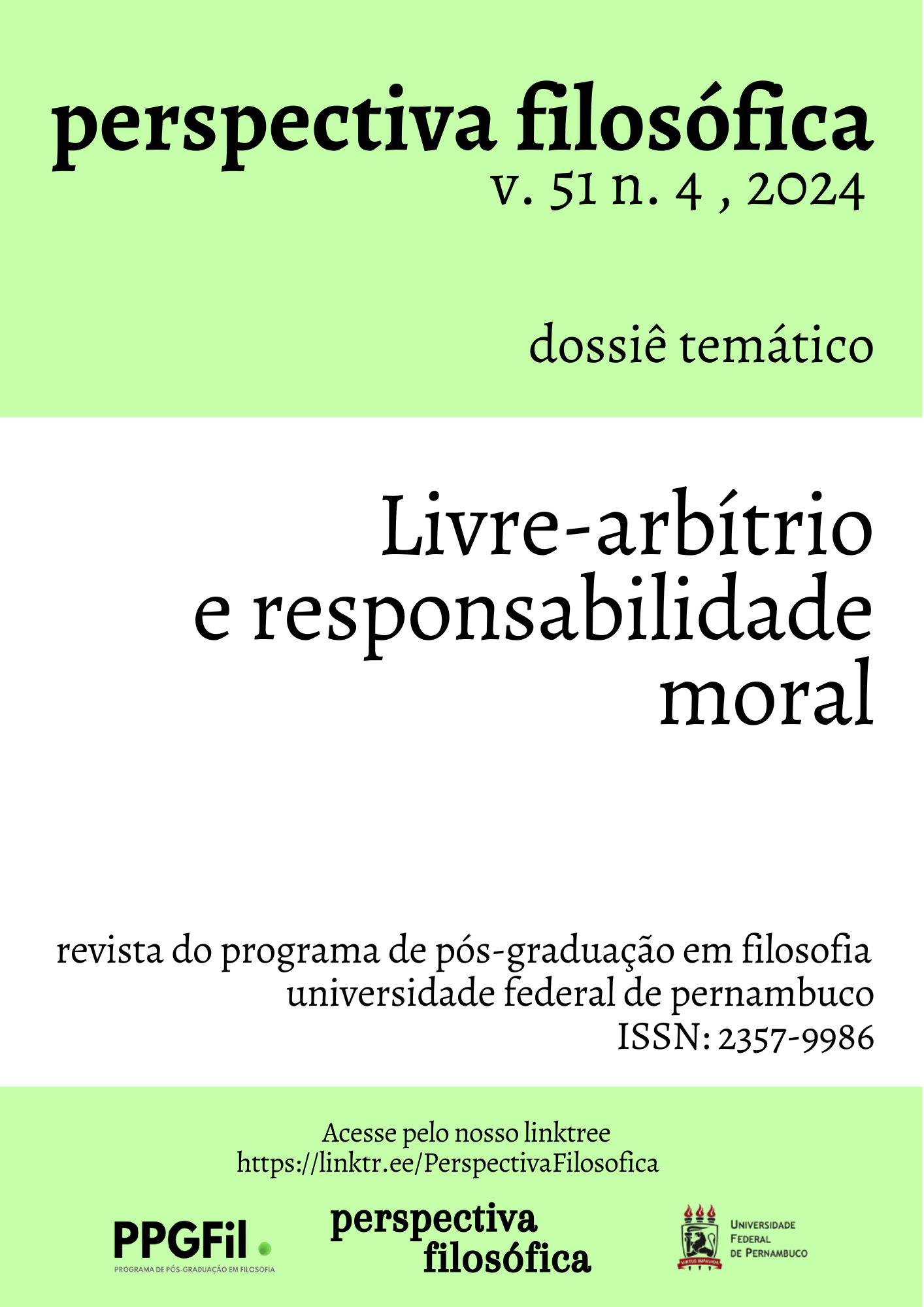The Problem of Free Will and The (Im)Possibility of Philosophical Progress
DOI:
https://doi.org/10.51359/2357-9986.2024.259873Keywords:
John Searle, Daniel Dennett, free will, progress in philosophy, compatibilismAbstract
The purpose of this article is to analyze John Searle's assertion that the traditional problem of free will is a philosophical scandal because it does not demonstrate relevant progress. Wilfrid Sellars' distinction between the manifest image and the scientific image of the human being is presented to provide context to the traditional philosophical problem of free will. The possibility of progress in philosophy is briefly discussed to assess whether the problem of free will is at a disadvantage compared to other philosophical issues. Finally, Daniel Dennett's compatibilism is proposed as a response to Searle. Free will, as understood through Dennett's evolutionary perspective, represents a form of progress in the philosophical endeavor to reconcile the manifest image and the scientific image.
References
CHALMERS, David. “Why isn’t there more progress in philosophy?” In KELLER, John A. Beinf, Freedom and Method: themes from philosophy of Peter van Inwagen. New York: Oxford University Press, 2017, p. 277-298.
DENNETT, Daniel C. Elbow Room: The varieties of free will worth wanting. Cambridge, Mass.: MIT Press, 1984.
DENNETT, Daniel C. Conciousness Explained. Nova York, Boston e Londres: Little, Brown & Co., 1991.
DENNETT, Daniel C. Freedom Evolves. Nova York: Penguin, 2004 [2003].
DIETRICH, Eric. “There is no progress in philosophy.” Essays in Philosophy, v. 12, n. 2, 2011, p. 329–344.
DILMAN, Ilham. Free Will: An historical and philosophical introduction. London: Routledge, 1999.
DUTRA, Luiz H. de A. “A liberdade é um fato natural ou uma construção social?” Principia, Florianópolis, v. 4, n. 2, 2000, p. 305-316.
DUTRA, Luiz H. de A. “Consciência e liberdade.” Veritas, Porto Alegre, v. 64, n. 2, 2019, p. 1-38.
ELTON, Matthew. Daniel Dennett: Reconciling science and our self-conception. Cambridge: Polity Press, 2003.
GERBER, William. “Is there progress in Philosophy?” Journal of the History of Ideas, v. 34, n. 4, 1973, p. 669–673. Disponível em: . Acesso em: 13 Mar. 2021.
GREENE, Joshua & COHEN, Jonathan. “For the law, neuroscience changes nothing and everything.” Philosophical Transactions of the Royal Society of London B. 359, 2004, p. 1775–1785.
KANE, Robert. The Significance of Free Will. New York and Oxford: Oxford University Press, 1998 [1996].
KANT, Immanuel. The Cambridge Edition of the Works of Immanuel Kant. Correspondence. Translated by Arnulf Zweig. Cambridge Edition of the Works of Immanuel Kant. Cambridge: Cambridge University, 1999.
KUHN, Thomas S. The Structure of Scientific Revolutions. Third Edition. Chicago: The University of Chicago Press, 1996 [1970].
LAUDAN, Larry. Progress and its Problems: Towards a theory of scientific growth. California: The University of California Press, 1977.
LIBET, Benjamin. Neurophysiology of Consciousness: selected papers and new essays by Benjamin Libet. Birkhäuser Boston, 1993.
MOODY, Todd C. “Progress in Philosophy.” American Philosophical Quarterly, v. 23, n. 1, 1986, p. 35–46. Disponível em: . Acesso em: 14 Mar. 2021.
PRATA, Tárik de A. “É o naturalismo biológico uma concepção fisicalista?” Principia, Florianópolis, v. 16, n. 2, 2012, p. 255-276.
RESCHER, Nicholaus. Free Will: an extensive bibliography, Berlin, Boston: De Gruyter, 2010.
SEARLE, John R. Minds, Brains and Science. Thirteenth printing. Cambridge, Mass.: Harvard University Press, 2003 [1984].
SEARLE, John R. The Rediscovery of the Mind. Cambridge, Mass., e London: The MIT Press, 9th printing, 2002 [1992].
SEARLE, John R. “Consciousness, free action and the brain.” Journal of Consciousness Studies, 7, No. 10, 2000, p. 3-22.
SEARLE, John R. Freedom and Neurobiology: Reflections on free will, language, and political power. Columbia University Press, 2007.
SELLARS, Wilfrid. Science, Perception and Reality. Atascadero, CA: Ridgeview, 1991 [1963].
SLEZAK, Peter P. “Is There Progress in Philosophy? The Case for Taking History Seriously.” Philosophy, v. 93, n. 4, p. 529-555, 2018.
VAN INWAGEN, Peter. “Freedom to Break the Laws.” Midwest Studies in Philosophy, v. 28, n. 1, 2004, p. 334-350.
WOLF, Susan. Freedom Within Reason. New York and Oxford: Oxford University Press, 1993 [1990].
ZAWIDZKI, Tadeusz W. Dennett. Oneworld thinkers. Glasgow: Oxford, 2007.
Downloads
Published
Issue
Section
License
Copyright (c) 2024 Thiagus Mateus Batista

This work is licensed under a Creative Commons Attribution 4.0 International License.
A Revista Perspectiva Filosófica orienta seus procedimentos de gestão de artigos conforme as diretrizes básicas formuladas pelo Conselho Nacional de Desenvolvimento Científico e Tecnológico (CNPq). http://www.cnpq.br/web/guest/diretrizesAutores que publicam nesta revista concordam com os seguintes termos:
Os autores mantém os direitos autorais e concedem à revista o direito de primeira publicação, sendo o trabalho simultaneamente licenciado sob https://creativecommons.org/licenses/by/4.0/deed.pt_BR que permite o compartilhamento do trabalho com reconhecimento da autoria e publicação inicial nesta revista.
Os autores têm autorização para assumir contratos adicionais separadamente, para distribuição não-exclusiva da versão do trabalho publicada nesta revista, com reconhecimento de autoria e publicação inicial nesta revista (Consultar http://opcit.eprints.org/oacitation-biblio.html).

Esta revista está licenciada com uma Licença Creative Commons Atribuição 4.0 Internacional.













